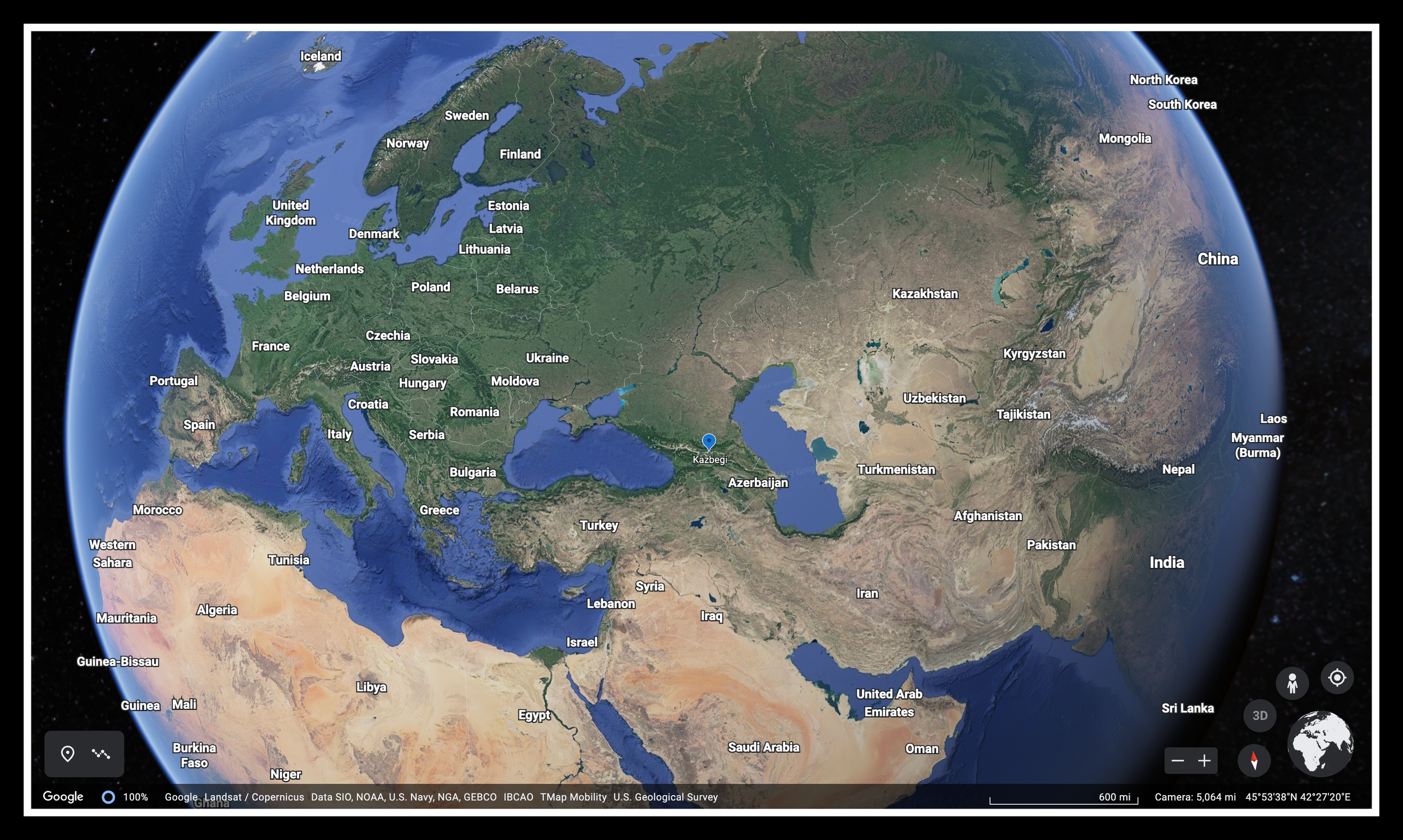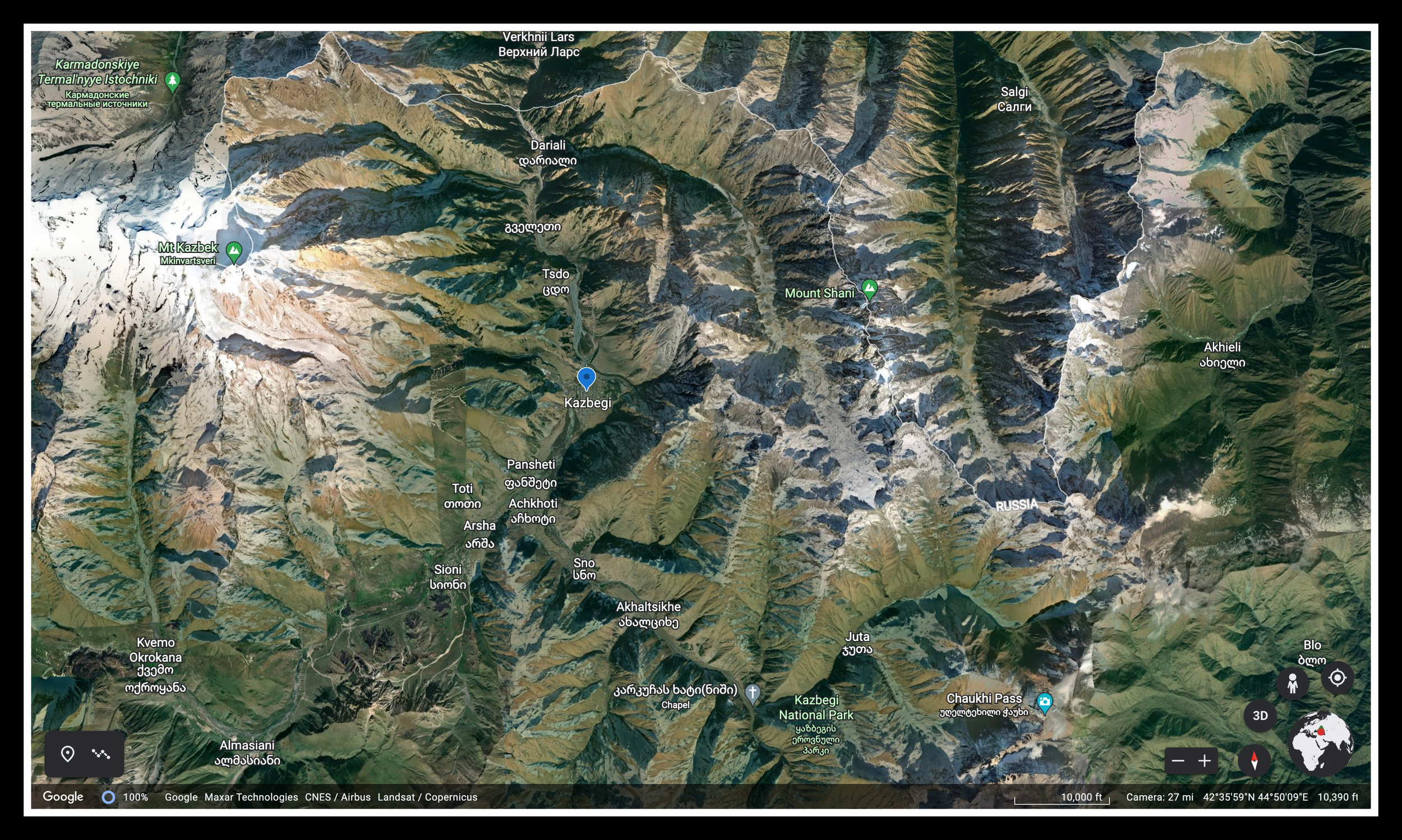146 - Kazbegi & Hurricane Olef (Kazbegi to Tbilisi, Georgia)
“Two things are infinite: the universe and human stupidity; and I'm not sure about the universe.”
- Albert Einstein
KAZBEGI (STEPANTSMINDA), a village nestled in a valley on the banks of the Tergi River in the shadow of Mt. Kazbegi, is ten miles from the Russian border north of Tbilisi along the Georgian Military Highway. A “quintessentially picturesque Georgian mountain village” doesn’t do the scene justice, but you get the idea. It’s lovely.
My first trip was a reconnaissance mission. I spent but a paltry twenty-four hours soaking up the vibe. My travel companions were on a schedule… fooey. I would need more. Much more. We slept at a homestay owned and operated by a woman named Nazi and her husband. That's right: Nazi. The transliteration from Georgian is unfortunate. Her name is pronounced Nahzzeee and has nothing to do with Hitler's political party. Nazi was not a Nazi. She was, however, warm and kindhearted, emphasizing the “home” in homestay. The Israelis staying there savored the irony as well.
Perched on a hill above the village on the lower slope of Mt. Kazbegi sits the Gergeti Trinity Church, dating to the 14th century. Many view it as a symbol of Georgia itself, its silhouette a beacon of religious fervor and devotion. The guidebook described its stature as autochthonous, a seemingly natural geologic formation chiseled and honed from the tectonics and erosive forces responsible for the surrounding mountains. Its isolation made it an ideal place to sequester sacred artifacts in times of dangerous upheaval.
Under Tsarist Russia, and later the U.S.S.R, religious services were banned, though it remained a popular tourist attraction. Evidence of Russian control remains on the outer walls a la Russian language graffiti. I found dates as far back as 1887 carved into the stone. After the fall of the Soviet Union, the locals dismantled a cable car that once ferried lazy day-trippers to the church, deeming the contraption a sacrilegious emblem of oppression. I wondered how they felt about the military helicopter filled with what appeared to be tourists that landed nearby. Somebody knew somebody important… heathens.
Courtesy of Alexander Isakh.
You know what they say. If you can't say (or write) anything nice…
Enter Olef, a Swedish fellow at my hostel (Dodo’s) in Tbilisi. I’m not sure “Olef” is the correct spelling, but I wasn’t sure Olef knew how to spell “Olef,” at least not in the state I met him. Our first introduction was at 3:00 a.m., when I went to the toilet, passing him in the kitchen, staring gerbil-eyed into his computer. He was smashed. We've all been there. The thing is, I never did meet sober Olef. When I spoke to him in the morning, I discovered he never went to bed. He had trouble walking upright and was mildly incoherent. He had a work-related disability (something with his arm) that required him to wash down painkillers with large volumes of alcohol.
He asked if I'd seen his cell phone and then requested I call it. I obliged. After eight rings, it was answered by an Australian guy in the common area next to the garden at Dodo’s. It was in Olef's jacket pocket, a jacket he had walked past a good dozen times that morning during his search.
Just to make sure he hadn’t sobered up, Olef purchased a big-ass jug of wine for breakfast. Later, on my way out of the kitchen, he asked if I'd seen his laptop, his “enormous-could-I-choose-a-bulkier-more-inconvenient-computer-for-travel” laptop. It was missing from the table with only his power adapter on the floor to indicate its absence. I hadn’t but then noticed it sitting on a table outside seconds later. I informed Olef, who replied, "Oh yeah, sorry, sorry." He’d just put it there moments before.
Olef was in the midst of a monetary crisis. An ATM had swallowed his debit card. I hypothesized he took his money and walked away or entered the incorrect PIN so many times the machine confiscated it. Poor Olef was in a financial pickle. He had US dollars but was reluctant to part with them, as he might not have enough cash for Ukrainian hookers. Keep in mind, he told me this. He had high praise for Georgian prostitutes; they were his “type” and so inexpensive, it was like “getting two for the price of one.” His fondness for courtesans precipitated his shortfall.
The only way he could pay for his room would be to exchange his precious dollars. He enlisted Dodo, the owner of the homestay, to assist. Olef dragged poor Dodo, a seventy-year-old woman, to the bank. He spoke Russian (widespread in Georgia) and was, theoretically, more than capable of accomplishing the task… or not. He was struggling with “shit-faced syndrome,” so perhaps having an “intoxication Sherpa” was for the best.
Upon arrival at the bank, Olef was shocked to discover a passport is required to exchange money. Dodo told him to retrieve it. He did so but came back empty-handed. He couldn’t find it. I guess he was hoping Dodo had mystical powers and could magically pull his passport out of her ass. She could not. Instead, she called home and asked her daughter to undertake a search and rescue mission. She found it on a bench near the garden.
Olef was also something of a hero. He rescued a kitten from the Dodo’s roof by climbing the rungs of a precariously unstable ladder. Have I mentioned the alcohol? Dodo wanted to strangle him, as her family had another mouth to feed. The new arrival caused dissension. Husband and daughter were pro-kitten, whereas she was decidedly anti-pussy.
Back to Olef. In the absence of an ATM card, he was desperate to acquire another, so he spent many hours on the phone with his bank. They agreed to FedEx it to him, which they did. It would’ve gone smoothly had he given them the correct address. He did not. Time was not on Olef's side as he had to catch a plane to Kyiv early in the morning. Those hookers weren’t getting any younger. He tried to divert the package. I overheard him say something about how the owners of his guesthouse had stolen his money and passport, there was nothing he could do, he was going to call the police, could they please help him, yada, yada, yada, yada, blah, blah, blah. Listening to him describe Dodo as an arch-criminal was amusing and vexing at the same time. He left the next morning, so I assume he worked it out, but then again…




























